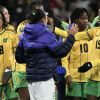Where are the woman coaches amid all the vibes?

The World Cup in Australia and New Zealand has showcased the strides made in women's football on the field in recent years -- while exposing the lack of woman coaches at all levels of the sport.
As the tournament heads into the quarter-finals, England boss Sarina Wiegman is the only woman left on the touchline.
The first 32-team Women's World Cup began with 12 woman coaches.
That's 37.5 percent, exactly the same as at the World Cup in 2019, when nine of the 24 teams in France had a woman at the helm.
"It is a problem not only on the international stage but at every level in the women's game," said Randy Waldrum, the American coach of the Nigeria team that lost on penalties to Wiegman's England in the last 16.
"We need more women coaching in the sport."
In England, where women's football is highly professional, five of the 12 teams in the Women's Super League finished last season with a woman manager.
In some other countries, including at the World Cup, women's football has only recently turned professional or even remains an amateur sport.
Many within the game believe that more woman coaches will inevitably filter through once women's football has had longer to take hold.
"There's naturally more male coaches," Wales manager Gemma Grainger told Sky Sports earlier this year.
"The men's game has been professional for much longer and we see that transfer of male coaches into the women's game, and that's the state we're at in this moment."
The hope is that the ratio will grow in the coming years, especially if current players convert to coaching when their careers end.
Although the proportion of woman coaches at this World Cup is the same as four years ago, there are hints of isolated progress.
Shui Qingxia played for China at the inaugural Women's World Cup in 1991 and was in charge of the team at this edition, becoming the first woman to coach China.
"What we hope is that that balance gets right in the future and we are working on that, at least in England," said Wiegman.
Wiegman is the standard-bearer for woman managers, having won the European Championship with her native Netherlands in 2017 before taking them to the World Cup final two years later.
She then won the Euro again last year with England.
The Lionesses are favourites to lift the World Cup in Australia and New Zealand, and if they do, Wiegman will be the third woman coach in a row to win it.
The USA lifted back-to-back World Cups in 2015 and 2019 under Jill Ellis.
At the previous three Olympics, Bev Priestman with Canada, Silvia Neid (Germany) and Pia Sundhage (United States) have all managed teams to gold.
The 2019 Women's World Cup final was the second, after 2003, to feature a woman in both dugouts.
That will not be repeated this year after Hege Riise's Norway, Inka Grings' Switzerland and Desiree Ellis's South Africa were all beaten in the last 16.
Waldrum, who has spent much of his career coaching women's teams at college level in the United States, said there needed to be investment and a change of mindset.
"It is not that men shouldn't be coaching," said Waldrum, who also had a spell in charge of Trinidad and Tobago.
"I think that if they love the women's game and they are invested in it, then we should have the opportunity to do it, but certainly we need bigger investment in women and women coaching."
He said it was also a question of "changing the old boys' club mentality too. That women can coach and can be very effective".

 For all latest news, follow The Daily Star's Google News channel.
For all latest news, follow The Daily Star's Google News channel. 








Comments